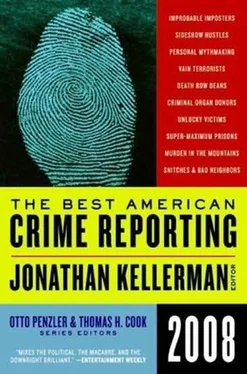Sutton, who served as Bush’s criminal justice policy director when he was governor and worked on his transition team at the Department of Justice after the 2000 election, was an unlikely target for conservatives. He had been devastated by the letter from Schlafly, whom he described as “a conservative icon.” He insisted that he was not soft on drug crimes, as his detractors had made him out to be, pointing out that his office led the nation last year in narcotics prosecutions and was second in illegal immigration cases. Yet he has received death threats for his role in the case, and his e-mail and voice mail are often filled with irate messages. “All people have heard is that two American heroes are in prison for doing their job and that a drug dealer has been set free,” he said. “If those were the facts, I’d be furious too. But the evidence is overwhelming that these guys committed a very serious crime.” If anyone was at fault for the fact that Aldrete-Davila was not in prison, he said, it was the agents. “They didn’t put handcuffs on him when they had the chance,” he explained. “They had him at gunpoint, at the bottom of a steep ditch, with his hands in the air. Instead of apprehending him, Compean tried to hit him over the head with the butt of a shotgun. Even after they shot him, they holstered their weapons and walked away.”
Sitting beneath half a dozen framed photos of himself with the president over the years, Sutton marveled at how media coverage had allowed the case to take on a life of its own. Lou Dobbs and others “with big microphones,” he noted, had repeatedly reminded viewers that Ramos had been nominated by his co-workers in 2005 for Border Patrol Agent of the Year. Yet they never mentioned that he had been arrested two times for domestic violence, in 1996 and 2002, and suspended from the Border Patrol, in 2003, for not reporting what had happened. (The charges were dropped, but Ramos was required to take a court-mandated anger management class.) More frustrating, he said, were the allegations that he was eager to lock up Border Patrol agents for doing their jobs. “Agents have shot their weapons at least fourteen times in the El Paso sector since I’ve been U.S. attorney,” Sutton said. “On three occasions, they killed the suspect. Every time, the agents came forward and explained why they had used deadly force. And in every instance-except this one-it was ruled justifiable.”
It was a case like U.S. v. Ramos and Compean , he said, where the defendants were federal agents, that tested our most basic principles. “What makes America great is the rule of law,” he said, leaning forward in his chair to emphasize his point. “It applies to everyone, no matter how powerful or important they may be. We give law enforcement the benefit of the doubt because they have to make extraordinarily difficult decisions in life-or-death situations. But when they do wrong, they have to be held accountable.”
His message fell on deaf ears on the last day of June, when roughly two hundred protesters amassed outside his San Antonio office to demand his resignation. Volunteers with the Minutemen and other anti-illegal immigrant organizations gathered on a grassy hill below the federal building holding handmade signs that read “Deport Johnny Sutton,” “Johnny Sutton: Best Justice the Peso Can Buy!,” “Free Our Heroes!,” “Prosecute Invaders, Not Defenders,” and “Amnesty for Ramos and Compean.” American flags fluttered in the breeze beside posters that pictured Sutton wearing devil’s horns. A woman walked through the crowd dragging a Mexican flag on the ground, asking people around her to step on it. A biker in an “America: Love It or Leave It” T-shirt shouted at the handful of counterprotesters across the street, who held up “Bad Cops Belong in Jail” and “No One Is Above the Law” placards. “Where are your green cards?” he yelled. “Go back to Mexico!” others screamed. A succession of speakers called for Sutton to step down, including Monica Ramos, whose husband, like Compean, is appealing his conviction.
Before the demonstration came to a close with the Pledge of Allegiance, a protester climbed into the back of a pickup and grabbed a bullhorn. “There are four kinds of boxes-the soapbox, the jury box, the ballot box, and the cartridge box,” he roared. “We have seen a misuse of the jury box. We’re going to use the ballot box to get rid of you. But don’t test our use of the last box.”
PAMELA COLLOFF has been a staff writer at Texas Monthly since 1997. She is a graduate of Brown University and was raised in New York City. In 2001, she was a finalist for a National Magazine Award in public interest for her article on school prayer. Her work has been anthologized in Best American Crime Reporting 2007 and Best American Sports Writing 2006 . She lives in Austin.
Coda
No other article during my ten years at Texas Monthly generated as much hate mail as this story. The mail was ugly and relentless. Wrote one reader, “I think everyone crossing the border into the United States illegally should not only be shot; they should be shot dead. That will secure our border in a hurry.” Another wrote, “I don’t give a damn if they shot [Aldrete-Davila] in the back, front, side, or wherever. He was here illegally.” And: “The only ‘dishonor’ for these agents is the fact that they didn’t kill the wetback drug mule.” One reader suggested that I leave the country, and another wrote that my article was “as much a part of the terrorist activity in the United States as…Al-Qaeda.”
These readers’ reoccurring criticism was that I should have “done my homework” by “reading the trial transcript” and talking to people who actually understood the case, such as the lawmakers and radio talk show hosts who have taken up the agents’ cause. In fact, I read the entire three-thousand-page trial transcript (which the article quotes extensively) as well as the lengthy investigative report issued by the Department of Homeland Security’s Office of Inspector General. I used primary sources whenever possible: I interviewed Ramos himself and corresponded with him from prison; I reviewed the sworn testimony of the other Border Patrol agents who were on duty at the time of the shooting; and when Compean declined to talk to me, I drew on his detailed statement to investigators. I also traveled to the West Texas town of Fabens, where the shooting occurred, and conducted interviews in El Paso, San Antonio, Houston, and Austin.
Interestingly enough, the positive feedback I received about the article came from Border Patrol agents themselves. One former agent wrote, “I was involved in three shooting incidents during my career: two as a field agent, and one as a supervisor. I had to fire my weapon in only one of those incidents. It would never have occurred to me, or anyone else involved, to not report these incidents. I have to agree with Sutton that had this shooting been handled by following appropriate policies it is unlikely any indictment would have been handed down.”
Three months after my story was published, the U.S. Attorney’s Office for the Western District of Texas announced that a federal grand jury had indicted Osvaldo Aldrete-Davila on charges of conspiracy and possession with intent to distribute marijuana. The charges stemmed from alleged drug smuggling that took place after the shooting, in the fall of 2005. Aldrete-Davila was arrested in El Paso and is awaiting trial.
Ignacio Ramos and Jose Alonso Compean are still serving time in federal prison, and are not due to be released until 2016 and 2017, respectively.
Malcolm Gladwell: DANGEROUS MINDS
FROM The New Yorker
Читать дальше












